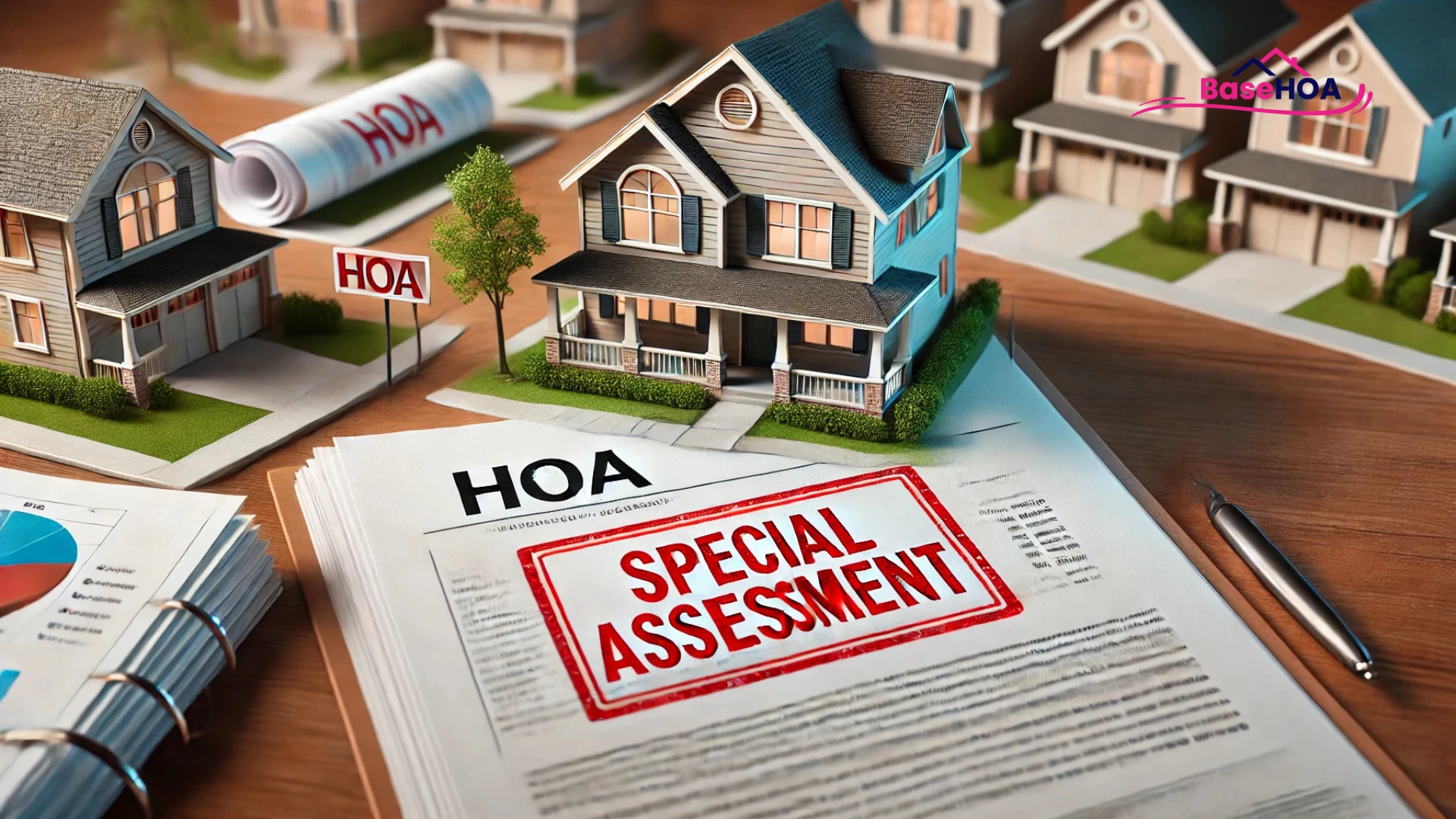Homeowners associations (HOAs) are responsible for maintaining shared community spaces, but unexpected expenses can sometimes arise. When an HOA doesn’t have enough reserve funds to cover major repairs or emergencies, it may issue a special assessment, an additional fee homeowners must pay.
If you are part of an HOA, understanding special assessments is very important. This guide will walk you through everything you need to know, including legal requirements and your rights as a homeowner.
Table of Contents
What Is an HOA Special Assessment?
A special assessment is a one-time fee charged by a Homeowners associations (HOA) to cover unexpected expenses that aren’t included in regular monthly HOA dues. These fees typically arise when major repairs, legal settlements, or emergencies exceed the association’s budget.
HOA Fees vs. Special Assessments
| HOA Fees | HOA Special Assessments |
|---|---|
| HOA fees are regularly scheduled payments that cover routine maintenance, amenities, and operating expenses. | Special assessments are one-time or temporary charges for specific projects when reserve funds are insufficient. |
For example, if a condominium’s roof needs emergency repairs due to storm damage and the HOA reserve fund isn’t enough to cover the cost, homeowners may be required to pay a special assessment to fund the project.
How Do HOA Special Assessments Work?
Special assessments follow a structured process, usually outlined in an HOA’s governing documents. Here’s how it typically works:
- Assessment Determination: The HOA board of directors identifies an expense that exceeds the budget.
- Homeowner Notification: Members receive a notice explaining the reason for the assessment, the amount due, and the payment deadline.
- Approval Process: Depending on the HOA’s rules, homeowners may need to vote on the assessment before it takes effect.
- Collection & Payment: Homeowners must pay the assessed amount within the specified timeframe.
Can You Refuse to Pay an HOA Special Assessment?
Refusing to pay can result in penalties, late fees, or even legal action. In some cases, the HOA has the authority to place a lien on your property or initiate foreclosure if the assessment remains unpaid. Be sure to check your HOA’s insurance policies and CC&Rs (Covenants, Conditions, and Restrictions) to understand your responsibilities and any potential protections.
Are HOA Special Assessments Tax Deductible?
For most homeowners, HOA special assessments are not tax deductible. However, if you own a rental property, you may be able to classify certain HOA fees and special assessments as deductible expenses.
Tax Rules for Special Assessments
- Personal Residences: Typically not deductible under IRS guidelines.
- Rental Properties: May be deductible as a business expense if the assessment covers property maintenance or improvements.
If you’re unsure about tax implications, consulting a tax professional can help clarify what applies to your situation.
Can an HOA Foreclose on Your Home for Unpaid Assessments?
Yes, in some states, an HOA can place a lien on a property and initiate foreclosure if special assessments go unpaid. However, the specific rules depend on state laws and the HOA’s governing documents.
What Determines an HOA’s Right to Foreclose?
- State laws: Some states have strict regulations that limit an HOA’s foreclosure power.
- HOA bylaws: The association’s governing documents outline the process for liens and foreclosure.
- Delinquency threshold: Some HOAs can only foreclose if the unpaid amount exceeds a certain limit.
If you’re struggling to pay, contact your HOA as soon as possible. They may offer payment plans or dispute resolution options to help you avoid serious legal consequences.
According to the U.S. Department of Housing and Urban Development (HUD), homeowners should be aware of their rights and the regulations surrounding HOA fees and foreclosure laws.
How to Challenge an Unfair HOA Special Assessment
If you believe a special assessment is unjustified, you have several options to dispute it. Here’s how:
- Review HOA Bylaws: Ensure the assessment aligns with your HOA’s legal guidelines and governing documents.
- Request Documentation: Ask for financial records, meeting minutes, or any other relevant documents that explain the charge.
- Attend Board Meetings: Raise concerns at board meetings to get clarification before any payments are due.
- File a Formal Dispute: If your HOA has an appeals process, submit a written objection outlining your concerns.
- Seek Legal Advice: If needed, consult a real estate attorney to explore legal action and understand your options.
While special assessments are sometimes unavoidable, homeowners have the right to challenge fees that seem excessive or improperly implemented.
Final Thoughts: Protecting Yourself from Unexpected HOA Fees
Special assessments can be a financial burden, but with the right knowledge and preparation, you can minimize their impact. Stay informed about your HOA’s financial health, attend meetings, and keep track of reserve funds to avoid surprise charges.
If you’re facing an unfair special assessment, don’t hesitate to reach out to your HOA or seek legal advice to protect your rights.
BaseHOA helps HOA boards stay organized, promote transparency, and manage finances effectively, reducing the likelihood of unexpected fees. By encouraging your HOA to use BaseHOA, you can ensure that your community is run efficiently and with your interests in mind.
Want to see how BaseHOA can improve your HOA’s financial management? Start your free trial now to help your HOA stay on track and keep costs predictable.


